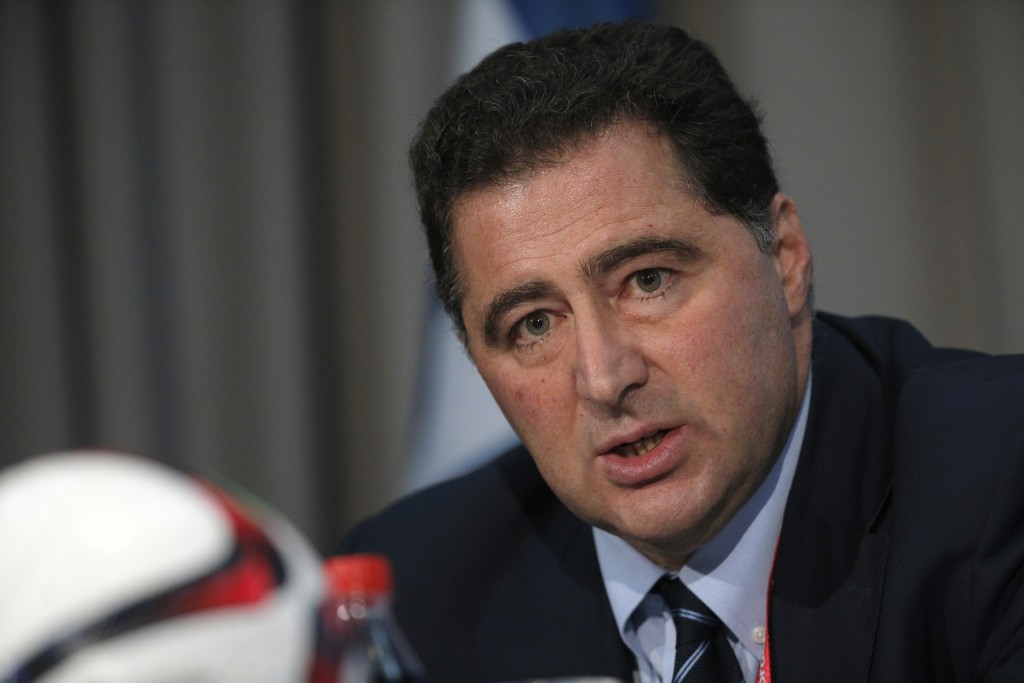
In this Friday, Dec. 19, 2014 file photo, FIFA chairman of audit and compliance Domenico Scala attends a press conference in Marrakech, Morocco. AP
ZURICH — The first public indication from within FIFA about the weight of the case against Sepp Blatter and Michel Platini was provided Tuesday (Wednesday Manila time) by its financial compliance head, who denounced a payment that led to the soccer leaders being suspended as a “classic conflict of interest.”
Blatter, the FIFA president, could also be culpable for the alleged “falsification” of accounts over the payment of 2 million Swiss francs (about $2 million) to Platini, according to Domenico Scala, the independent chairman of FIFA’s audit and compliance committee.
Blatter authorized the financial transaction in 2011 and Platini now says it was salary he was owed from his work as a presidential adviser between 1998 and 2002. The debt should have been detailed in FIFA’s accounts from 2002 until the 2011 payment, but was not, Scala said in an interview with The Associated Press.
Both Blatter and Platini have acknowledged there was only a verbal agreement between them for the outstanding pay, which has sparked investigations by both the Swiss attorney general and FIFA ethics investigators.
Blatter and Platini are serving 90-day provisional suspensions, while FIFA’s ethics committee completes a full investigation into the actions of two of the most powerful officials in world sport.
Scala, whose audit committee was established in 2012, is the first FIFA insider to speak out publicly on the most high-profile ethics case in the governing body’s 111-year history.
“Both parties, the president and Mr. Platini should have recused from their positions because both are members of the executive committee of FIFA and they both have a conflict of interest,” Scala told the AP.
“Mr. Platini has asked the president to pay him a prescribed amount, which he should not have asked, which is why it is a classic conflict of interest.”
The case could end Platini’s hopes of succeeding Blatter as FIFA leader in an election set for February, although both men deny wrongdoing and are appealing against their suspensions.
Scala is also head of the ad-hoc election committee which rules on the eligibility of presidential candidates, but the Swiss businessman has no say in the ethics case.
Blatter last week said he had a “gentleman’s agreement” with Platini over the payment.
“If it is true what they are saying that they had an oral agreement at the time they made the written contract to defer the payment, that payment should have been recorded in the accounts in 2002 and subsequent years,” Scala said. “It has not. If you approve as a member of a supervisory board financial accounts which you know that 2 million are not accrued you have possibly done a falsification of a document.
“It doesn’t make a difference if you do that in a limited company or an association. The result and the consequences are the same.”
Scala stressed that it is an issue if “two members of the executive committee, have an agreement and no one knows about it.”
“It is their obligation to disclose it to the executive committee that they have such an agreement,” he said.
Platini initially cited financial problems at FIFA as the reason that he was not paid the full salary he was owed by 2002.
But the former France captain then said in an interview with Le Monde published Monday that Blatter suggested that FIFA’s salary policy prevented him from having a contract that paid the Frenchman more than then secretary general Michel Zen-Ruffinen.
“I worked for several months without pay,” Platini said. “After a while, I go see Blatter: ‘You have a problem paying me?’ He says: ‘Yes, I can’t pay you 1 million because of the wage structure. You must understand that the secretary general gets 300,000 Swiss francs. You can’t get more than three times his salary. So we’ll write you a contract for 300,000 Swiss francs and pay the rest later.’ And that’s what happened. Only later never arrived.”
Platini said he invoiced FIFA for 2 million Swiss francs in 2011 because he mistakenly recalled that he had been paid 500,000 Swiss francs annually at the time, and not 300,000.
It was the Swiss attorney general who first disclosed details of the allegedly “disloyal payment” by Blatter after questioning him as a suspect following a surprise swoop on his office in Zurich last month.
Platini was the election front-runner until Sept. 25, when he was questioned by Swiss federal police as between a witness and an accused person.

